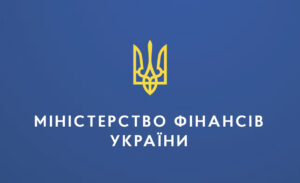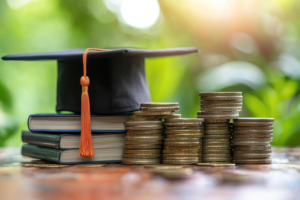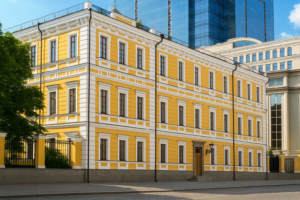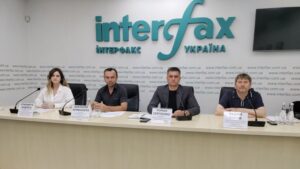
As we know, personnel are everything. This is not just an empty phrase, because in science, where training sometimes takes decades, the future of a country is determined by the availability of qualified researchers.
After the collapse of the USSR, where scientists occupied an honorable place in the hierarchy of professions, Ukraine acquired one of the largest research systems in Europe. The scientific school of the Ukrainian SSR era was known for its advanced technologies and groundbreaking ideas. Subsequently, in the early years of independence, changes in the structure of the economy began. While in 1991-1995 the share of industry in GDP exceeded 40%, by 2024 it had fallen to 19.0%, and the service sector had taken the lead, growing from 40% to over 70%.
The country’s economic problems and economic transformation also led to a reduction in funding for science. The dynamics of this reduction are shown below:
Table 1. Dynamics of expenditure on research and development in 2010-2023.
|
Years |
Research and development expenses – total, million UAH | Share of research and development expenditure in GDP, % |
| 2010 | 8107,1 | 0,75 |
| 2011 | 8513,4 | 0,65 |
| 2012 | 9419,9 | 0,67 |
| 2013 | 10248,5 | 0,70 |
| 2014 | 9487,5 | 0,60 |
| 2015 | 11003,6 | 0,55 |
| 2016 | 11530,7 | 0,48 |
| 2017 | 13379,3 | 0,45 |
| 2018 | 16773,7 | 0,47 |
| 2019 | 17254,6 | 0,43 |
| 2020 | 17022,4 | 0,41 |
| 2021 | 20973,8 | 0,38 |
| 2022 | 17117,8 | 0,33 |
| 2023 | 21348,1 | 0,33 |
The share of science spending in gross domestic product (GDP) has been steadily declining since 2010 and has fallen to 0.33% in recent years. Back in 2017, the World Bank noted that “…the current innovation policy and corresponding state funding do not meet the critical needs of the Ukrainian national innovation system.” A significant reduction in funding has led to the disappearance of a number of scientific institutions (SIs) and a decline in the prestige of scientific work. Young people are not going into science because of low salaries and the low status of scientists. It cannot be otherwise, given that the salary of a senior researcher at the National Academy of Sciences of Ukraine is 13,034 hryvnia.
All this has led to increased migration, a decrease in the number of scientists, and a loss of opportunities to reproduce human resources. The number of personnel in the field of research and development (R&D) has decreased sevenfold: from more than 400,000 people in 1991 to 63,800 in 2024. Below you can see the dynamics of the number of personnel engaged in R&D.
Fig. 1. Dynamics of the number of personnel employed in R&D in Ukraine

Table 2. Dynamics of the number of personnel employed in R&D in Ukraine
| Years | Number of employees involved in scientific research and development – total, persons | Including | ||
| researchers | technicians | support employees | ||
| person / as a percentage of the total number of employees involved in scientific research and development | person / as a percentage of the total number of employees involved in scientific research and development | person / as a percentage of the total number of employees involved in scientific research and development | ||
| 2010 | 182484 | 133744 / 73.3 | 20113 / 11.0 | 28627 / 15.7 |
| 2011 | 175330 | 130403 / 74.4 | 17260 / 9.8 | 27667 / 15.8 |
| 2012 | 164340 | 122106 / 74.3 | 15509 / 9.4 | 26725 / 16.3 |
| 2013 | 155386 | 115806 / 74.5 | 14209 / 9.2 | 25371 / 16.3 |
| 2014* | 136123 | 101440 / 74.5 | 12299 / 9.0 | 22384 / 16.5 |
| 2015 | 122504 | 90249 / 73.7 | 11178 / 9.1 | 21077 / 17.2 |
| 2016 | 97912 | 63694 / 65.1 | 10000 / 10.2 | 24218 / 24.7 |
| 2017 | 94274 | 59392 / 63.0 | 9144 / 9.7 | 25738 / 27.3 |
| 2018 | 88128 | 57630 / 65.4 | 8553 / 9.7 | 21945 / 24.9 |
| 2019 | 79262 | 51121 / 64.5 | 7470 / 9.4 | 20671 / 26.1 |
| 2020 | 78860 | 51427 / 65.2 | 7117 / 9.0 | 20316 / 25.8 |
| 2021 | 68808 | 44321 / 64.7 | 5879 / 8.6 | 18288 / 26.7 |
| 2022* | 53221 | 36084 / 67.8 | 5020 / 9.4 | 12117 / 22.8 |
| 2023 | 58567 | 38845 / 66.3 | 4542 / 7.8 | 15180 / 25.9 |
| 2024 | 63847 | 42670 / 66.8 | 5148 / 8.1 | 16029 / 25.1 |
The period of sharp decline in the number of R&D personnel (1991-1999) was characterized by a drop in funding. Subsequently, in 2000-2008, the number of research personnel stabilized at 200,000. The financial crisis accelerated negative trends in the dynamics of R&D personnel. This was followed by the annexation of Crimea and parts of the eastern regions, and the war. In 2024, the UNESCO report “Analysis of war damage to the Ukrainian science sector and its consequences” noted that as a result of the Russian Federation’s aggression, 12% of scientists were forced to emigrate or move within the country. Of these, 6.3% were forced to emigrate to other countries, and 5.5% became internally displaced persons. About 30% of all scientists began to work remotely. In other words, there was a “brain drain” from science. According to some data, more than 20,000 R&D workers were temporarily displaced or left Ukraine in 2022. Thus, losses associated with the war were added to the traditional outflow of scientific personnel. Changes in the structure of science have also led to the disappearance of the previously massive category of designers and technologists. Ukraine’s recovery will take place through investment projects that will require a huge amount of design and technological documentation, which no one is left to prepare.
Table 3 shows that, in addition to the decline in the number of scientists, there is also an aging of science. The most numerous age group in science is scientists over 65 years of age. Scientists aged 55 and older make up about 40% of scientists.
Table 3 Number of researchers involved in R&D by age:
| up to and including 25 years of age | 25-29 years | 30-34 years | 35-39 years | 40-44 years | 45-49 years | 50-54 years | 55-59 years | 60-64 years | 65 years old and older | |
| 2016 | 1876 | 6418 | 7863 | 7488 | 6216 | 4936 | 5816 | 6593 | 6328 | 10160 |
| 2020 | 949 | 3165 | 5418 | 6239 | 5714 | 4927 | 4123 | 4957 | 5191 | 10744 |
| 2016 | 2.9% | 10.1% | 12.3% | 11.8% | 9.8% | 7.7% | 9.1% | 10.4% | 9.9% | 16.0% |
| 2020 | 1.8% | 6.2% | 10.5% | 12.1% | 11.1% | 9.6% | 8.0% | 9.6% | 10.1% | 20.9% |
The situation with personnel in science is such that it can be described in the words of Ernest Hemingway: “Ask not for whom the bell tolls, for it tolls for thee.” And without personnel, there will be no science.
In the structure of science funding, the largest share is concentrated in the business sector – 59.9%, in the public sector it is 33.4%, and in the higher education sector – about 6.7% of expenditures. In terms of personnel, the public sector accounts for 49%, the business sector for 34.6%, and higher education for 16.4%. Scientific institutions and universities are predominantly state-owned. Research in universities is not a key activity and is largely separate from teaching.
The main channels of public funding are the Ministry of Education and Science, sectoral academies, and the National Research Fund of Ukraine. Another source is the foreign sector. In the pre-war period, foreign sources accounted for 20-25% of R&D funding in Ukraine. In the context of the war, foreign partners have stepped up grant funding.
For many years, Ukrainian science has been unsuccessfully trying to establish links with business due to the lack of a comprehensive policy aimed at supporting such cooperation. However, these efforts are often fragmented, short-term, and insufficiently integrated into national innovation and industrial strategies. The lack of coordination between universities, business, and government agencies hinders the development of an innovation system.
Another feature of Ukrainian science is the almost complete absence of funding from regional sources, which is incomprehensible given the decentralization and significant increase in community budgets, which are not being used for regional science. It appears that local authorities know nothing about science and do not want to use it.
The negative changes in the state of Ukraine’s scientific human resources urgently require state intervention to stabilize and further reduce these influences. The state body responsible for the development of science, the Ministry of Education and Science, is monitoring these trends and attempting to change the situation.
Recently, the Ministry of Education and Science prepared the Concept for the Support and Development of Human Resources in the Field of Scientific and Scientific-Technical Activities, “National System of Researchers of Ukraine” (NSR), which was approved by the Cabinet of Ministers of Ukraine. The concept “aims to identify, recognize, support, and promote the best Ukrainian scientific and scientific-pedagogical workers who have achieved outstanding results in scientific and scientific-technical activities and made a significant contribution to the development of science in the country, as well as to provide them with further individual financial support.” Support will be provided to scientists on the basis of questionnaires, regardless of their current ability to conduct research.
The proposed NSD is based on a rating assessment of scientists’ achievements, with additional funding for the best researchers. However, distributing money based on questionnaires among a limited number of scientists, as is essentially proposed, is not rational.
The set of indicators for determining the best mainly duplicates the indicators used in state certification of institutions. It is unclear how the summarization will be carried out and how the characteristics of different scientific disciplines will be taken into account. And how, for example, can a representative of fundamental science be compared with someone from an industry or a theoretical physicist with a lawyer? Furthermore, scientists perform different functions in scientific teams: some generate ideas, some conduct experiments, etc.
Furthermore, with the support of individual scientists, the place and role of creative teams and infrastructure and information support are completely negated. Scientists do not work alone, but as part of teams with their own functions.
The use of mechanistic approaches to ratings will primarily support scientists with many years of experience in science and managers (they have better publication indicators, in particular thanks to the opportunities for co-authorship and the “duration” of scientific work). It is impossible to apply the same requirements to everyone. Therefore, the general ranking of Ukrainian scientists is an artificial measure. In developed countries, such rankings are not conducted. The idea of distributing funds among scientists based on rankings is not new. In Ukraine, there was an attempt to create something similar in the Lviv region. There are no mentions of its results.
Another example of support for scientists at the national level is Mexico, where the NSD has been operating since the mid-1980s as a response to the mass emigration of scientists to the United States. It is difficult to assess the effectiveness of this system because, in addition to it, the government has applied other incentives, in particular various grant programs. However, the level of emigration of scientists from Mexico remains high, and the results of the impact of the creation of the NSD are unclear to its initiators. Other Latin American countries with similar problems have not introduced it.
Ukraine needs solutions that are not copies of foreign models, but responses to its own challenges. To overcome Ukraine’s personnel problems in science, it is necessary to:
1. Strictly comply with the provisions of the Law of Ukraine “On Science and Scientific Activity” with a level of funding for science at 1.7% of GDP.
2. Make scientific work prestigious by significantly increasing scientists’ salaries, which will ensure the competitiveness of Ukrainian science.
3. Ensure acceptable basic funding for universities and substantial funding on a competitive basis, as well as partial funding for regional science and education institutions from local budgets.
4. Create and implement mechanisms for financing regional science aimed at solving regional problems from community budgets.
5. Introduce a number of specialized competitions at various levels (national, regional, departmental, etc.), including in cooperation with foreign partners, where the customers would be national government bodies, regions, and private companies seeking to solve priority problems. This will lead to the financing of scientific teams for work on relevant projects, rather than individual scientists receiving rent for questionnaires.
6. Allow only organizations from the “Register of Scientific Institutions” to participate in competitions for research using budget funds.
Today, Ukrainian science is on the brink of survival. Without systematic action on the part of the state and society, we risk losing the intellectual capital necessary for the restoration and modernization of the country.
Author: Volodymyr Khaustov, scientific secretary of the State Institution “Institute of Economics and Forecasting of the National Academy of Sciences of Ukraine”, Honored Economist of Ukraine, Candidate of Technical Sciences.

The Ukrainian state budget for 2025 allocates UAH 14.5 billion for science funding, while the draft (adopted) state budget for 2026 sets this figure at UAH 20.1 billion, according to materials from the Ukrainian Ministry of Finance.
In the Ministry of Finance’s presentation on the 2026 budget, 3.2 billion hryvnia is earmarked for supporting science on a performance basis, 1 billion hryvnia for creating scientific centers for defense developments, and 0.7 billion hryvnia for projects by young scientists.
At the same time, the latest available official summary statistics on internal expenditures for research and development (R&D) refer to 2024: they amounted to UAH 28.328 billion, which is 32.7% more than a year earlier; R&D intensity (share of GDP) increased to 0.37% from 0.30% in 2023.
According to the summary review, in 2024, 616 organizations were engaged in research and development, and the number of personnel employed in R&D was 63,800.
In terms of the structure of R&D funding in 2024, 30.6% came from the organizations’ own funds, 40.8% from the public sector (including 38.5% from the state budget), 11.6% from the business sector, and 15.9% from foreign sources.
By sector, the business sector accounted for 59.9% of domestic R&D expenditure, the public sector for 33.4%, and the higher education sector for 6.7%.
Ukrainian legislation sets a benchmark whereby the state provides budgetary funding for scientific and scientific-technical activities in the amount of at least 1.7% of GDP.
Compared to the EU, Ukraine’s R&D indicators remain low: according to Eurostat estimates, in 2024 the European Union spent €403.1 billion on R&D, and R&D intensity amounted to 2.2% of GDP (unchanged from the previous year).
The “domestic R&D expenditure” indicator reflects the total expenditure on research and development within the country from all sources. The “funding for science in the state budget” indicators are a narrower snapshot and are not equal to total domestic R&D expenditure.
https://expertsclub.eu/ukrayina-v-2026-r-planuye-201-mlrd-grn-na-nauku/

The 2026 state budget provides for UAH 298.8 billion in funding for the Ministry of Education and Science of Ukraine.
“The Verkhovna Rada of Ukraine has approved the state budget for 2026. The document provides for a significant expansion of investment in human capital: UAH 298.8 billion is allocated for education and science, which is UAH 85.4 billion more than in 2025,” the Ministry of Education said in a statement.
Key areas of funding include: education — UAH 278.7 billion (+UAH 79.8 billion by 2025); educational infrastructure and investment projects — UAH 17 billion, including UAH 6.2 billion for shelters in schools and kindergartens; free school meals — UAH 14.4 billion to provide meals for 3.5 million students in grades 1–11; textbooks — UAH 2.1 billion is allocated for the purchase of textbooks for grades 4 and 9; scholarships for students — UAH 6.6 billion.
It is also planned to allocate UAH 19.9 billion to science, in particular, almost UAH 3 billion for basic funding of universities and scientific institutions based on the results of state certification; UAH 998 million for research centers of advanced experience; UAH 100 million for a new competition for applied developments in partnership with business; UAH 300 million for competitive research.
“Education and science remain among the key priorities of the state in 2026. The increase in funding demonstrates that Ukraine is consistently investing in human potential, technological strength, and future sustainability — the foundation of our victory and development,” the ministry emphasized.
As reported, the 2024 state budget allocated UAH 171.2 billion to finance education, while the 2025 state budget allocates UAH 197.3 billion to finance education.

The Ministry of Education and Science of Ukraine has completed the state certification of higher education institutions and scientific institutions in the fields of agricultural, veterinary, and social sciences using a new method of assessing scientific effectiveness, according to Vladimir Khaustov, an expert at the Experts Club information and analytical center and scientific secretary of the Institute of Economics and Forecasting of the National Academy of Sciences of Ukraine, in a blog posted on the Interfax-Ukraine news agency website.
According to him, for the first time, not only institutions as a whole were evaluated, but also individual scientific departments — a step that should “truly support the strongest teams and stimulate real competition in Ukrainian science.”
“Without funding for science, there is no future. We are rich not because we have money, but because we fund science,” Khaustov recalled, quoting Ronald Reagan.
He noted that the new certification methodology “is not perfect, but necessary.” Among the positive changes, the expert mentioned the division by scientific fields and the attempt to introduce quantitative indicators. However, according to him, the consolidation of scientific groups (for example, combining all social sciences — economics, history, sociology — into one category) creates methodological distortions.
“The formula should take into account the specifics of the disciplines, and the weighting coefficients should be differentiated. Now, much of it has been reduced to arithmetic, which does not reflect the real contribution of scientists,” the expert emphasized.
Among the problems, Khaustov highlighted excessive bureaucracy in filling out reports and the lack of data automation:
“All indicators are entered manually, although publications and patents are already in the DNTB and UkrNOIVI databases. We proposed creating an automated system called ”Science of Ukraine,“ which would collect data itself, but so far everything is done manually.”
He also drew attention to the imbalance between the evaluation of domestic and foreign publications, as well as the underestimation of national grants and scientific achievements.
“Three hryvnia of Ukrainian funding is equivalent to one hryvnia of foreign funding. And seven out of eleven indicators relate to publications abroad. This distorts the real picture and devalues national achievements,” he said.
According to the expert, the methodology needs to be refined to take into account the specifics of the industry and the real working conditions of Ukrainian researchers.
“Science is not a formula or a table. It is people, ideas, and the future of the country,” concluded Volodymyr Khaustov.
The full version of the expert’s video is available on the Experts Club channel:
Experts Club is an independent platform for analytical videos and research. The center regularly publishes expert reviews on economics, science, and business, bringing together the opinions of leading analysts, scientists, and business representatives.

The Experts Club Information and Analysis Center presents a selection of significant discoveries in the field of astronomy and space over the past week. The collection includes significant global sources.
Mysterious object 3I/ATLAS approaches Mars
3I/ATLAS, the third known interstellar object to enter the Solar System, was discovered on July 1, 2025, by the ATLAS telescope in Chile. The orbit of 3I/ATLAS is hyperbolic — the object is not bound by the Sun’s gravity and will not revolve around it, but will only pass through the Solar System. According to calculations, on October 3, 2025, it will pass at a distance of approximately 0.19 astronomical units (≈ 28 million km) from Mars.
In the scientific article “3I/ATLAS (C/2025 N1): Direct Spacecraft Exploration of a Possible Relic of Planetary Formation at ‘Cosmic Noon’,” the authors discuss that at the moment of passing inside the orbit of Mars, the comet may be observable from aboard Martian spacecraft.
In addition, there is a high probability that the JUICE probe (ESA mission to Jupiter’s moons) will also detect 3I/ATLAS in November 2025. Recent estimates of the mass of this object place it higher than previous estimates — it may be more massive than previously thought.
Localization of the brightest FRB (Fast Radio Burst)
An international team of astronomers has been able to pinpoint the source of the brightest FRB signal ever recorded and link it to a specific galaxy.
This achievement helps to better understand the nature of these powerful radio pulses and their possible connection to neutron stars or magnetars.
New theory of Type Ia supernovae
An article in The Astrophysical Journal proposes a mechanism whereby some Type Ia supernovae may be triggered by primary black holes without companions.
This could affect the use of these explosions as “standard candles” in cosmology.
New data from Trace Gas Orbiter about Mars
Analysis of images and spectra from the ExoMars/Trace Gas Orbiter mission has shown that Recurring Slope Lineae on Mars can form without the involvement of liquid water — probably due to dust avalanches. The discovery of oxide and seasonal ozone layers in the Martian atmosphere has also been noted.
Discovery of a potential new satellite of Uranus
The James Webb Space Telescope (JWST) has discovered a potential new satellite of Uranus, provisionally named S/2025 U1, with a diameter of about 10 km, located outside the planet’s ring system.

Educators and researchers report systemic violations of their rights as a result of several recent initiatives of the Ministry of Education and Science of Ukraine (MES), supported by the government. According to them, the changes threaten to increase the shortage of professional staff in technical and engineering fields.
“Postgraduates, higher education institutions in court proceedings, are forced to defend their legal and constitutional rights and freedoms, due to another attempt by the Cabinet of Ministers of Ukraine and the Ministry of Education and Science of Ukraine to reorganize educational processes and educational institutions, to reduce the number of universities and to introduce additional control measures not provided for by the laws and the Constitution of Ukraine, which leads to violations of the constitutional rights and freedoms of educators, scientists, children and youth, in that part which cannot be restricted during the legal regime of martial law, in accordance with the Constitution of Ukraine,” said postgraduate student, head of the charitable organization “Charitable Foundation ‘Change Our Lives’” Roman Serhiyenko at a press conference at the “Interfax-Ukraine” agency.
According to Serhiyenko, the adopted Resolution of the Cabinet of Ministers No. 426 of April 8 gave MES the right to amend the procedure for training applicants for the degree of Doctor of Philosophy and Doctor of Sciences. This creates grounds for the expulsion of postgraduate students even if they successfully fulfill their educational and research requirements.
“According to the response letters of MES No.1/8845-24 dated 20.05.2024 and the Ministry of Justice of Ukraine No.81631/C – 18859/7.2.4 dated 31.05.2024, these initiatives did not undergo legal and anti-discrimination examination of the Ministry of Justice of Ukraine and were returned by the Cabinet of Ministers of Ukraine to MES, as indicated in the response to the lawyer’s request No.1/16685-24 dated 13.09.2024, signed by Deputy Minister of Education and Science of Ukraine Mr. Vynnytskyi,” – the Serhiyenko press release states.
In addition to educators, members of parliament also opposed the reorganization, organizing the collection of signatures under a collective appeal to the Prime Minister demanding the cancellation of “changes aimed at depriving citizens of Ukraine of their constitutional rights and freedoms.”
The participants of the event called to:
ban the reorganization and liquidation of educational institutions for at least three years after the end of the war/martial law;
ban the transfer of educational institutions for lease as a single property complex;
ban the sale of property of educational institutions;
change the conditions of the competition for the position of head of an educational institution and limit the term of holding the position.
The press conference was also attended by: head of the Council of Higher Education Applicants, Doctor of Philosophy of NTU “Dnipro Polytechnic” Yelyzaveta Bodriaho; teacher of professional-theoretical training of the State Vocational School “Higher Vocational School No.8 in Stryi” Anatolii Kryvosheiev; head of the legal department of Tavria National University named after V. I. Vernadskyi, Vadym Rykov.